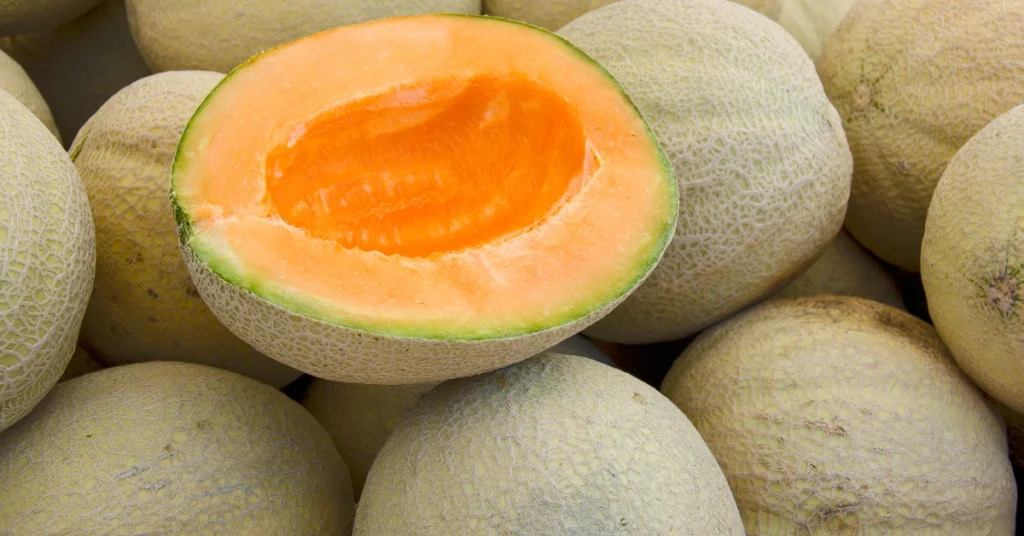Muskmelon, also known as cantaloupe, is a refreshing and nutrient-rich fruit that becomes especially popular during the summer months. Packed with water content and natural sweetness, it is often considered a great option to stay hydrated and energized.
However, for people managing diabetes, every food choice matters. Understanding how muskmelon impacts blood sugar levels is essential to deciding whether it fits safely into a diabetic meal plan.
Nutritional Profile of Muskmelon
Muskmelon is a low-calorie fruit packed with essential nutrients that make it a healthy choice for most people, including those with diabetes, when consumed mindfully. A 100-gram serving of muskmelon approximately provides:
- Calories: 34 kcal
- Carbohydrates: 8.2 grams
- Sugars: 7.9 grams
- Fiber: 0.9 grams
- Protein: 0.8 grams
- Fat: 0.2 grams
- Vitamin C: 36.7 mg (61% of daily requirement)
- Vitamin A: 169 μg (19% of daily requirement)
- Water Content: About 90%
Muskmelon is also a good source of potassium, which supports heart health and helps in maintaining blood pressure, an important factor for diabetics.
Its high water content makes it naturally hydrating, while the fiber present helps slow down the absorption of sugars into the bloodstream, which can be beneficial for blood sugar control.
Read More: Is Suji Good for Diabetes? Here’s What You Should Know
Glycemic Index and Glycemic Load of Muskmelon
Understanding the glycemic index (GI) and glycemic load (GL) of muskmelon is essential for managing diabetes effectively.
The glycemic index measures how quickly a food raises blood sugar levels. Muskmelon has a moderate glycemic index, generally ranging between 65 to 70. However, because of its high water content and relatively low carbohydrate density, its glycemic load remains low when consumed in moderate portions.
- Glycemic Index of Muskmelon: ~65–70 (moderate)
- Glycemic Load per 100g serving: Low (around 4–5)
This means that while muskmelon can cause a quicker rise in blood sugar compared to very low GI foods, its overall impact remains mild when eaten in reasonable amounts. The fiber and water in muskmelon help slow down sugar absorption, making it a better fruit choice compared to other high-sugar fruits.
For individuals with diabetes, focusing on glycemic load is more practical than just the glycemic index, and muskmelon fits well within a balanced, portion-controlled diet.
Is Muskmelon Good for Diabetes?

Muskmelon can be a good addition to a diabetic diet when eaten in moderation. Its natural sweetness often raises concerns, but due to its high water content, low calorie count, and decent fiber levels, muskmelon does not cause sudden or extreme blood sugar spikes when consumed carefully.
Here’s why muskmelon can be beneficial for diabetics:
1. High Water Content
Muskmelon is composed of nearly 90% water, which helps in maintaining hydration and supports kidney function, both important for diabetic management.
2. Low Glycemic Load
Even though the glycemic index of muskmelon is moderate, its glycemic load remains low when eaten in controlled portions. This means it has a relatively mild impact on blood sugar levels compared to many other sweet fruits.
3. Rich in Fiber
The fiber in muskmelon slows down sugar absorption in the bloodstream, helping to prevent sudden glucose spikes after meals.
4. Packed with Essential Nutrients
Muskmelon provides a good dose of vitamin C, vitamin A, and potassium, all of which support overall health and help manage complications that are often associated with diabetes, such as heart problems and weak immunity.
How Much Muskmelon Should a Diabetic Eat?
Portion control plays a major role when it comes to enjoying muskmelon safely with diabetes. While muskmelon offers hydration and essential nutrients, consuming it in large amounts can still cause a spike in blood sugar levels.
For individuals with diabetes, it is generally recommended to consume around 100 to 150 grams of muskmelon per serving, roughly about one small bowl. This portion provides the benefits of fiber, vitamins, and hydration without adding too many sugars to the diet.
Key tips for portion control:
- Pair muskmelon with a source of protein, like a handful of nuts, to slow down sugar absorption.
- Avoid eating muskmelon on an empty stomach to prevent sudden sugar spikes.
- Stick to one serving per day and avoid combining it with other high-sugar fruits in the same meal.
Eating muskmelon in moderation allows diabetics to enjoy its natural sweetness without putting their blood sugar control at risk.
Best Ways to Include Muskmelon in a Diabetic Diet
Muskmelon can be easily incorporated into a diabetic diet, provided it’s eaten in moderation and combined with other healthy foods to balance its sugar content.
Here are some great ways to enjoy muskmelon:
1. Muskmelon Salad
Combine muskmelon with leafy greens, cucumber, and a sprinkle of lemon juice for a refreshing, hydrating salad.
2. Smoothies (Without Added Sugar)
Blend muskmelon with some Greek yogurt or almond milk for a creamy, low-sugar smoothie. Avoid adding extra sweeteners.
3. As a Snack
Slice muskmelon and pair it with nuts or seeds to enhance protein and fiber intake.
4. Frozen Muskmelon Bites
Cut muskmelon into bite-sized pieces and freeze them. These make for a cool, sugar-free treat.
Precautions and Things to Remember
While muskmelon can be a beneficial addition to a diabetic diet, it’s essential to keep a few precautions in mind:
1. Eat in Moderation
Even though muskmelon is low in calories and has a low glycemic load, consuming it in large quantities may still affect blood sugar levels. Stick to one small serving (100-150 grams) per day.
2. Avoid on an Empty Stomach
Eating muskmelon on an empty stomach may cause a rapid rise in blood sugar levels. It’s best to consume it as part of a balanced meal.
3. Check Ripeness
Ensure the muskmelon is ripe. Unripe melons may have a higher starch content, which can be harder to digest.
4. Monitor Blood Sugar Levels
As with any food, monitor your blood sugar after eating muskmelon to understand how it affects your individual response.
Conclusion
Muskmelon, when consumed in moderation, can be a great fruit for individuals with diabetes. Its low glycemic load, high water content, and essential nutrients make it a hydrating and healthful option. However, portion control is key, as overeating may still impact blood sugar. By pairing muskmelon with other low-GI foods and monitoring your blood sugar, you can enjoy this sweet, refreshing fruit while managing your diabetes effectively.
FAQ
1. Can muskmelon be eaten daily by diabetics?
Yes, in moderate portions (100-150 grams), muskmelon can be eaten daily as part of a balanced diet.
2. Does muskmelon increase blood sugar levels?
When consumed in moderation, muskmelon has a mild effect on blood sugar levels due to its low glycemic load.
What’s the best time to eat muskmelon?
It’s best to eat muskmelon with other meals rather than on an empty stomach to avoid rapid blood sugar spikes.




